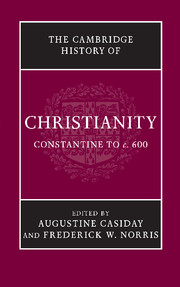Book contents
- Frontmatter
- Introduction
- Part I Christianity: Regional Developments
- Part II Christianity Contested
- 5 Religious dynamics between Christians and Jews in late antiquity (312–640)
- 6 Christianity and paganism, I: Egypt
- 7 Christianity and paganism, II: Asia Minor
- 8 Christianity and paganism, III: Italy
- 9 Christianity and paganism, IV: North Africa
- 10 The intellectual debate between Christians and pagans
- 11 Christianity and Manichaeism
- 12 Heresiology: The invention of ‘heresy’ and ‘schism’
- Part III Christian Culture and Society
- Part IV Christian Beliefs and Practices
- Index
- Map 1 The Roman empire, c. 400">
- References
11 - Christianity and Manichaeism
from Part II - Christianity Contested
Published online by Cambridge University Press: 28 March 2008
- Frontmatter
- Introduction
- Part I Christianity: Regional Developments
- Part II Christianity Contested
- 5 Religious dynamics between Christians and Jews in late antiquity (312–640)
- 6 Christianity and paganism, I: Egypt
- 7 Christianity and paganism, II: Asia Minor
- 8 Christianity and paganism, III: Italy
- 9 Christianity and paganism, IV: North Africa
- 10 The intellectual debate between Christians and pagans
- 11 Christianity and Manichaeism
- 12 Heresiology: The invention of ‘heresy’ and ‘schism’
- Part III Christian Culture and Society
- Part IV Christian Beliefs and Practices
- Index
- Map 1 The Roman empire, c. 400">
- References
Summary
The religion of Mani arose from a Judaeo-Christian milieu in southern Mesopotamia in the third century – a time of both cultural and religious syncretism. When it was first proclaimed in the Roman empire by missionaries from the Syriac-speaking parts of the Persian empire it was attacked by pagan emperors as a Persian religion bent on destroying the moral fabric of the empire and by Christian leaders as a Gnostic-type heresy embodying a strong element of Marcionism as well as numerous pagan and foreign (mainly Iranian) features. The discovery of genuine Manichaean sources, from Turfan in Central Asia and from Medinet Madi and Kellis (Ismant el-Kharab in the Dakhleh oasis) in Egypt, has shown that Manichaeism was a universalist religion founded not to imitate but to surpass other major religions of late antiquity in order to absorb their followers into its fold. In an important mission statement preserved in a Coptic text from Medinet Madi, Mani declares:
The church that I have chosen is superior in ten aspects over the first churches. So, one: [… the apostles] that were sent to them chose a church with much toil. Some of them came in … only; others among them have come in … alone; and each of them came in, [they chose the] churches that they chose in the places and the cities where they were disclosed. The one who chose his church in the west, his church did not reach to the east; the one who chose his church in the east, his election did not come to the west. Thus, there are some of them: their name did not display in other cities.
However, my hope, mine: It is provided for it to go to the west and also for it to go to the east; and in every language they hear the voice of its proclamation, and it is proclaimed in all cities. In this first matter my church surpasses the first churches: Because the first churches were chosen according to place, according to city. My church, mine: It is provided for it to go out from all cities, and its good news attains every country.
- Type
- Chapter
- Information
- The Cambridge History of Christianity , pp. 279 - 295Publisher: Cambridge University PressPrint publication year: 2007

